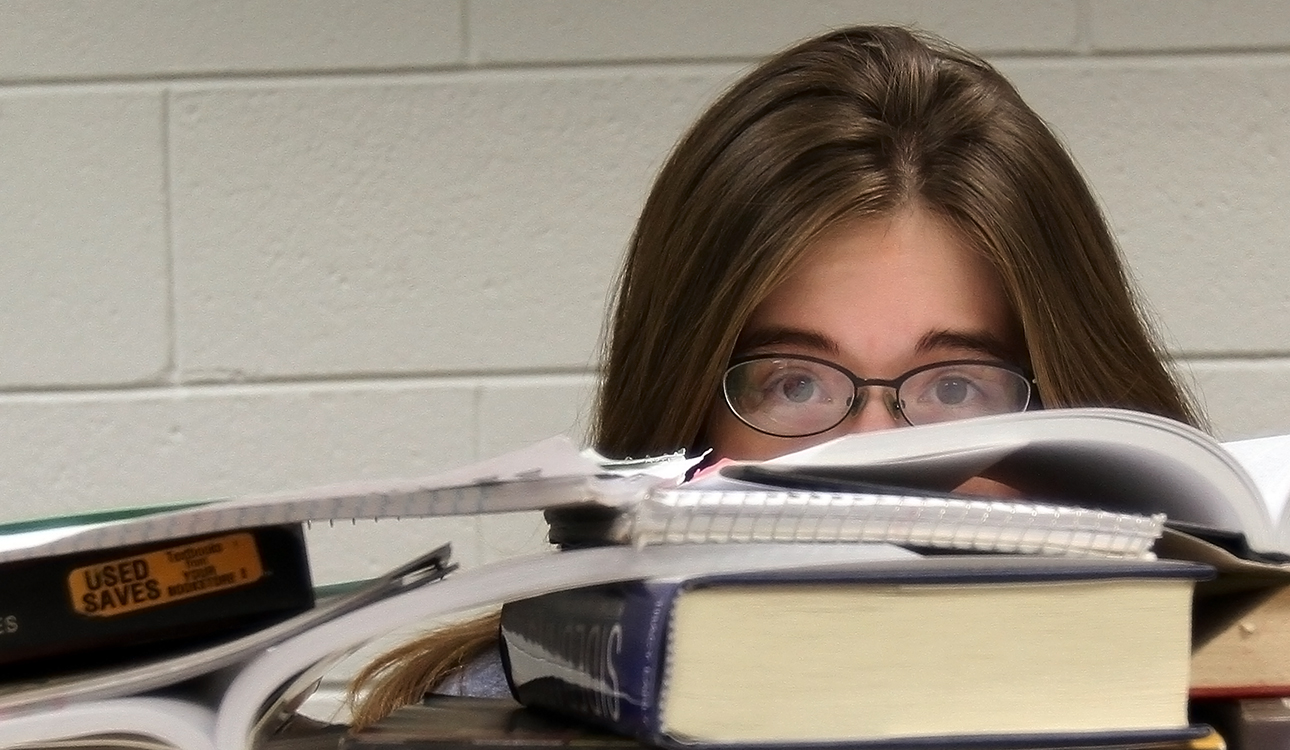
Linda Nguyen
A&E Editor
As we swing in to the spring semester, cognitive psychologist Dr. Charles Weaver gives the Lariat his professional take on what study methods work and which ones don’t.
What are some good general study tips for students?
Probably the two or three most important things would be to first, study in what we would call a distributed way. To prepare a little bit every day or a lot each day rather than try to cram all your study time in to a day or two before the test. Cramming will work if you just need to remember information for a day or so, but if you want to remember information in the long term, spacing it out in the way we just described is by far the best way to do it. Second big tip would be to take the opportunity to test yourself even if that cuts into your study time. If you have 10 hours to prepare for a test, you’re better off studying 5 hours, testing yourself for 5 hours than you would be studying all 10 hours. Studying is not as effective as test-taking for learning. That’s probably one of the most counterintuitive things we’ve learned in the past ten years. Testing has huge benefits for learning as long as you test yourself honestly.
What kind of experience do you have in understanding how students take in and retain information?
A couple ways that’s what I was trained in. I’m a cognitive psychologist. I study how people learn and how people remember. I’ve been on department of education grant panel for the better part of 10 years now, so folks who want to study how students learn in an educational setting apply to get supported. They send in grants and maybe about 10% of them get funded, so about twice of year, about 20 of us get together to decide which of these are more promising and which of these are not. And then probably the most important is simply to keep current in the literature to see what my colleagues at other universities are doing.
Do you see anything in your classes that confirms your findings about studying?
Students repeatedly suffer from what researchers call the “illusion of knowing.”They think they understand something when they really don’t. That’ll happen for example when you make flash cards. If you look at the front end where the question is and take a peak of the back at the answer and tell yourself “Oh yeah I would have recognized that” that’s going to lead to a tremendous over confidence on the part of the students. You see students think test taking strategies are more important than they are. They’re really not. What students ought to focus on isn’t how am I going to be tested but how can I maximally learn? And the last thing you see, and it’s not unique to students, cognitive effort is aversive to most people. Given a choice between reading “War and Peace” and watching Gilligan’s Island, we all watch Gilligan’s Island. People just don’t like to engage in cognitive effort, me included. But that’s what it takes. Almost anything you do to make studying easier is going to impair your long term attention.
What do you feel about students listening to music while they’re studying?
A lot of students do that. Most students have discovered if I listen to music that has words, it’s going to impair me and it does. Interesting about that, even if you’re listening to someone singing in a language you don’t speak, you’re listening to somebody singing opera in Italian, it’s going to screw up your ability to concentrate. Words, language take a special role, we can’t ignore it. So I always advise folks to turn off the music but if you’re going to put music on, make sure it doesn’t have any words to go with it.
What about white noise?
White noise is just kind of the air conditioner hum, static on the radio, at low levels probably masks other noises but it certainly doesn’t help. Everyone’s looking for an edge. Really, what’s going to cause you to learn the material is to spend a lot of time with it, to do the kinds of things that encourage understanding. There’s no magic bullet, you can’t put headphones in and take a nap and expect to retain it. Everybody wants a lot of return for very little effort and t just doesn’t work that way. Not just here, anybody who’s trying to sell you a diet where you eat nothing but cookies and cake well that’s not going to work either. All of us would like the benefits of exercise without having to put the effort for it. It just doesn’t work that way.
What do you recommend to a student who feels overwhelmed by a class or doesn’t believe they can make a good score in the class?
They need to break things down into manageable goals. Students that come to Baylor that say my goal is to become a neurologist, there’s really nothing you can really do in the next five minutes that will help you do that, but if you break that into goals and say okay to do that, I have to get into medical school, to do that, I have to keep my grades up, to keep my grades up, I have to study every day put time and effort into that and I can do that. So break it down into something that they can do. If they say I need to make a 100 on the next three tests, there’s nothing you can do today to fix that. But if you say I need to do better in the next test, I need to learn what’s in chapter 4 or the first half of Chapter 4 or the first 5 pages. Break it down into manageable chunks, manageable goals, something you can check to see you’re making progress. Students also ought to be a bit more realistic. Students come into college with a tremendous variety of academic experiences and someone who has avoided science their entire life is going to struggle in a pre-med biology class the same way someone who has never practiced a violin is going to struggle if they tried to join the Baylor orchestra, so a lot of student success and failure is determined by the kind of work they’ve done before they even come to college. Doesn’t mean students can’t make A’s and B’s, but it means some are better prepared to do that than others.
Can you describe the profile of a student who would get the most out of class?
The student who is always about half a chapter ahead when they read, so they’re ahead of what I’m lecturing on, the student who never misses class. Student who when they read, when they study, do so in an active way. Take notes, put question marks in the margin and get those questions answered in class. They get ready for test days in advance so that rather than studying the last few days before a test, they’re reviewing their material. And then successful students are those who know when they don’t understand something and then they take steps to allow them to understand. They knock on a professor’s door and ask for help. They spend more time rereading a section in the book, they ask fellow students in a classroom.
Sometimes students may feel intimidated knocking on a professor’s door or really don’t know what to ask or where to start. What do you suggest to those students?
That’s a perfectly okay thing to say. We can be intimidating people, we try not to be and Baylor prides itself on having faculty that is accessible. Quite honestly, for almost all of us, teaching is the fun part of our job, so, get over it, knock on doors, send emails, no professor is going to feel put upon by a student doing that. We actually enjoy doing that.
When a student first comes in, knocks on the door, what do they say?
The student ought to ask what kind of questions they have before they get in. What specifically is it that they don’t understand, express it as best they can, but we’re also used to students saying “I got lost at the very beginning and I have no idea what’s going on. I am almost too lost to ask a meaningful question” and then we’ll ask you guys questions and back it up to the point where we say ah see what you don’t get is this and we’ll go from there.
Can you tell me about a time you were most scared as a student? Going to talk to a professor? In a class?
I was a Baylor undergrad too and my profs were simply not intimidating. Every one of them that I went to turned out to be really nice people. I’m lucky that I’ve not had that experience of knocking on somebody’s door and them saying get out of here you’re bothering me. But I would think most Baylor students would also not have that problem. Baylor’s just not that kind of place.
What do you think about study drugs? Or the myth of study drugs?
It’s another situation where people are trying to find something for much less effort. It’s like weight loss drugs or exercise drugs. It’d be great if we could take a pill and get our six pack abs, but it just doesn’t work that way. Caffeine in small does can be effective but you tolerate to the effects pretty quickly. The widespread use of ADHD drugs, Ritalin, things like that, really bother me. I wouldn’t be surprised if we did a random drug test during finals and found half the students might have amphetamines in them. It wouldn’t surprise me, but it concerns me. Those are really addictive substances and the gains you get from them are temporary and they don’t last. Students are looking for an edge. It really doesn’t give them the edge they think it does and it comes with some pretty significant risks. If there’s ever a study drug that’s out there, I’ll let you know, don’t get your hopes up.
Can you see symptoms of study drugs on your students’ faces?
You can sometimes and it’s more during finals then other times. You see people that are functioning on very little sleep, people who are hyper-excitable, really stressed and it’s impossible to know just by looking at somebody are they just nervous or are they triple dosing on Ritalin but if students do the kinds of thing throughout the course of the semester to master the material, rather than try to cram for finals, they won’t find the same amount of anxiety. Anxiety creeps in when students feel unprepared and are running out of time. It feels like things are out of their control. The best way you can start studying for finals is to start studying the first day of class. It’s really hard to play catch up especially if you’re taking three or four or five classes.
Professors and students have slightly different goals. Professors want students to master knowledge. You can do things that elevate your test scores short-term, but professors generally put things into place to prevent that. It makes studying harder, but long term retention better.






